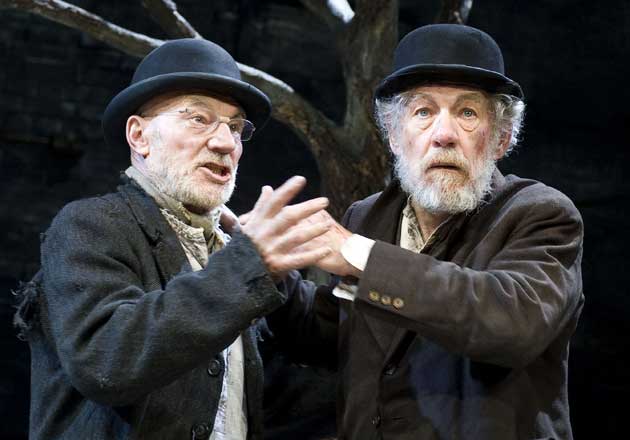First Night: Waiting for Godot, Theatre Royal, Haymarket, London
Banter, bitching and brilliance

Your support helps us to tell the story
From reproductive rights to climate change to Big Tech, The Independent is on the ground when the story is developing. Whether it's investigating the financials of Elon Musk's pro-Trump PAC or producing our latest documentary, 'The A Word', which shines a light on the American women fighting for reproductive rights, we know how important it is to parse out the facts from the messaging.
At such a critical moment in US history, we need reporters on the ground. Your donation allows us to keep sending journalists to speak to both sides of the story.
The Independent is trusted by Americans across the entire political spectrum. And unlike many other quality news outlets, we choose not to lock Americans out of our reporting and analysis with paywalls. We believe quality journalism should be available to everyone, paid for by those who can afford it.
Your support makes all the difference."Sewer-rat, curate, cretin... critic!" Don't you love it when people talk dirty to each other? Vladimir and Estragon do nothing but for two hours in a play once described as the one where nothing happens twice. But as Beckett's tramps are played by Patrick Stewart and Ian McKellen – renewing an old association going back through the X-Men films to the RSC forty years ago – the banter and the bitchiness has an added sting.
These really are two old has-beens who might-have-been fifty years ago, repeating an old routine within a plaster false proscenium on a sloping platform of boards with a stage trap where Godot's transfigured messenger boy appears with not much news and Simon Callow's bulbous Pozzo interrupts a double act devoted to blathering about zilch.
The play's traditionally best with Irish actors in it; they seem to get the rhythm and the meaning right down to the bones, and Pozzo's slave on a string Lucky always finds a strange Celtic lilt to his incomprehensible outburst. But Sean Mathias's Haymarket production – who'd have thought it, Beckett in the Haymarket?! – redefines the vaudeville in the trans-Pennine shuffle of Boltonian McKellen and West Yorkshire Stewart.
Stewart's Vladimir is restrained and accommodating, mildly embarrassed about having to rush off to the wings for a piss (the great giveaway about Beckett's theatrical setting), neatly bespectacled, slightly daunted by the idea that he's on the stage at all in order to give the impression that he exists. Nothing McKellen throws at him is too much, but he copes. He plays second fiddle and seems reasonably happy about it.
The odd thing about McKellen is that he acts his boots off as Estragon – quite literally, placing them downstage like querulous by-standers giving off odours – but never seems hampered by his trademark mannerisms or intonations. His huge hams of hands are eloquently deployed throughout and his big rheumy eyes rake the void, and the auditorium, without beseeching our sympathy or cheap laughter.
It's a wonderful double act, combining the old world dignity of Alan Howard and Ben Kingsley ten years ago (the first spoke in minims, one critic said, the other in crotchets) and the low vulgarity of Max Wall and Trevor Peacock even further back... McKellen has said that he sees Pozzo and Lucky as a pair of old hams living upstairs in an abandoned dressing room, but even Callow can transcend old lad theatricality in his blazoned pomp and later reduced circumstances of blindness and instability.
Ronald Pickup's Lucky, long-haired and remaindered like Ben Gunn, is a beautiful repository of old memories, symbolising an enslaved, dependent partner while Vladimir and Estragon shuffle about for primacy in the outer room of what might well be an audition process. Is Godot a casting agent after all, do Vladimir and Estragon turn up here every night waiting for a nod and a wink in the right direction?
The production retains an abstract, unpretentious mood in designer Stephen Brimson Lewis's location where the tree sprouts (as specified) three green leaves after the interval and Paul Pyant's lighting marks out the territory and isolates the tramps in terrifying white pools of soliloquy.
Godot is fifty-five years old now, and it's impossible to think that anyone might find it difficult or obscure, though it still seems like a play that cannot make up its mind in the battle between philosophy and religion. The truth is, it's about both, and the wonderful humanity of Stewart and McKellen ensures that you never think for one minute they are talking nonsense.
Or at least, it's nonsense we don't mind listening to, and born of a situation where the protagonists simply don't know what might happen to them next. All they can do is turn up and hope for the best next morning. And how difficult is that to understand, I wonder? As the journalist said in the George Clooney movie, good night, and good luck.
To 28 June (0845 481 1870 www.waitingforgodottheplay.com
Join our commenting forum
Join thought-provoking conversations, follow other Independent readers and see their replies
Comments